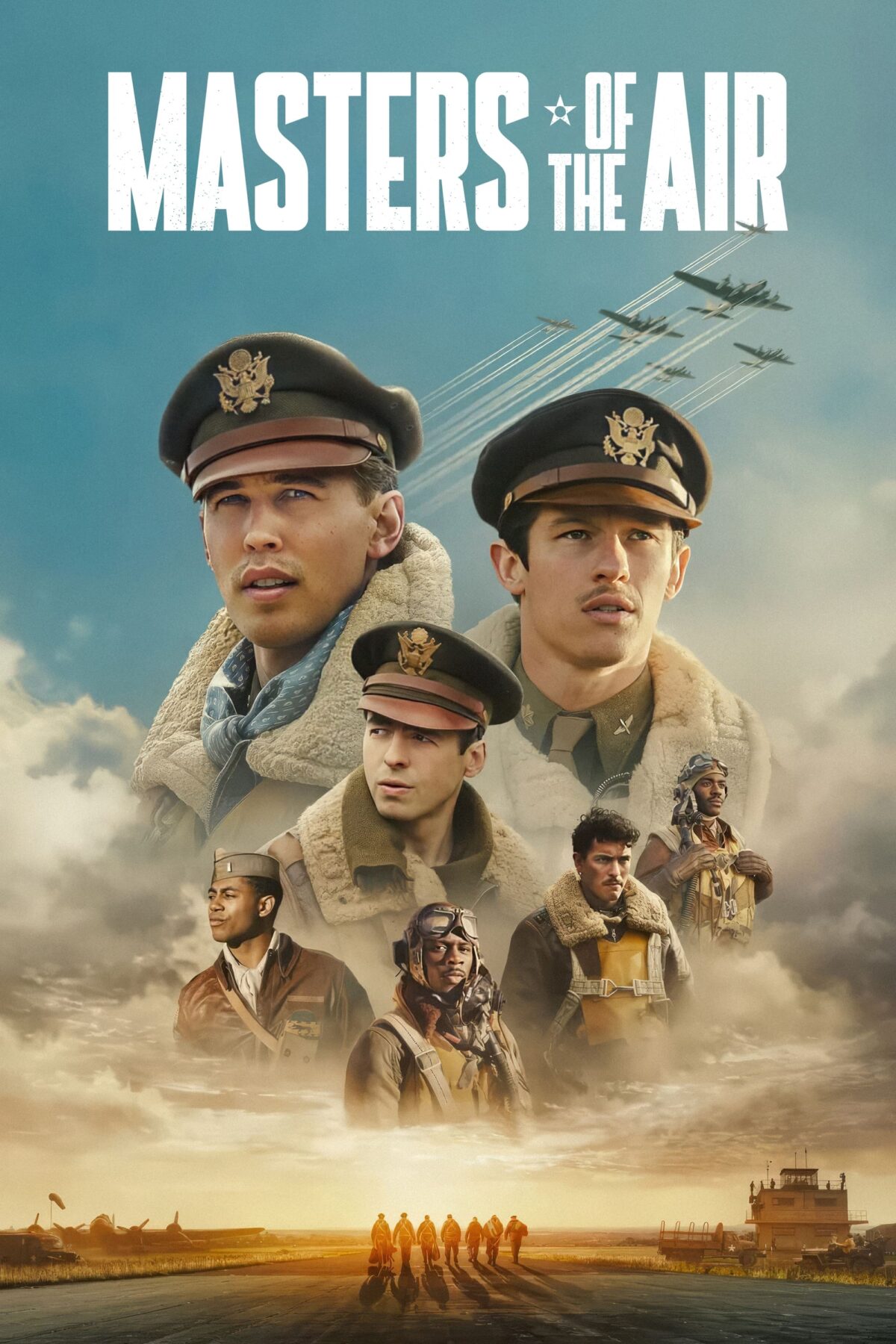Like the droning of an incoming bomber wing, the newest Second World War miniseries from producers Tom Hanks and Steven Spielberg has been on the horizon for a while. After telling the story of the 101st Airborne’s Easy Company in the landmark Band of Brothers and the wider narrative of the war against the Japanese in The Pacific, this newest series showcases the men of the “Bloody 100th” bomber wing as they wage high-altitude warfare against the infrastructure and manufacturing of Nazi Germany, largely before Allied boots hit the ground in Europe. As can be expected from this team by now, the show is a gorgeous example of historical storytelling, and while the personal experiences of its characters take center stage, certain elements of its narrative also complemented many of my own recent studies of the Second World War–whether intentionally or not.
Masters of the Air is largely framed as the story of Gale “Buck” Cleven and John “Bucky” Egan, two B-17 Flying Fortress pilots in the American 100th Bomb Group based in the United Kingdom–though narrated by Harry Crosby, the group’s Chief Navigator. Cleven and Egan begin flying missions over enemy territory in June of 1943, and their wing quickly earns its nickname for the horrific casualties it suffers bombing German targets in daylight–a decision that improves bombing accuracy at the cost of improving anti-aircraft and enemy fighter accuracy as well. As more and more pilots and crew are lost to the grueling attrition, replacements are brought in and new faces fill out the cast, including possibly the greatest pilot to fly in the 100th, Robert “Rosie” Rosenthal. Soon enough, even Gale and Egan are shot down, finding themselves reunited in Stalag Luft III prison camp (and later having their own attempts at escape foiled by the increased security presence following the famous “Great Escape” of British Commonwealth soldiers from the same camp). Even Rosie has the misfortune to need to bail, though luckily close enough to the advancing Russian lines in the east to make it to friendly forces without being captured. By the waning days of the war, however, all our major characters find their way back to active service and spend their final missions in the air running supply drops to Dutch civilians, not a cloud of flak in sight, before ultimately flying off into the sunset on their way home to be demobilized.
While its predecessor The Pacific attempted to tell a more comprehensive history of its particular theater of the Second World War, Masters of the Air returns to a more niche narrative, and in my opinion is all the better for it. The choice to focus on bomber pilots, as opposed to fighter pilots, intentionally steers the series away from what could have been a more superficial action drama and into the hidden costs of waging the sort of industrial, total war the Allies committed to in order to loosen the Third Reich’s hold on continental Europe. Indeed, seeing the conditions these men flew under and the casualties they endured in service of the war effort reinforced my own skepticism that these high altitude bombing campaigns were worth the tremendous effort, materiel, and lives put into them–while Master of the Air does not explore the actual impact on their targets, Alan Allport’s fantastic Britain at Bay persuasively argues that at least initially, any destruction was too indiscriminate and easily repaired to have had much impact on Nazi’s Germany’s war effort. The show’s aerial scenes are truly gripping (Rosie’s harrowing return flight as the only surviving plane from the wing’s mission to Munster is an all-time great sequence), and while I was disappointed they had largely disappeared by the back half of the episodes, I equally applaud the choice to show the full experience of many of these men after they had been shot down. My biggest complaint, ironically, was the inclusion of the Tuskegee Airmen and their famous Red Tail fighter squadron; while the impulse to include a more diverse cast of characters is a good one, the decision to only introduce them late in the series and give them combined screen time of less than even one full episode unfortunately felt shoehorned in as an afterthought.
While it still does not quite live up to the heights of the seminal Band of Brothers miniseries, Masters of the Air is a fantastic show in its own right, and one I consistently looked forward to, episode by episode. While I haven’t seen any yet, it can only be a matter of time until watch-order lists begin coming out to combine all three series into one master chronological narrative of the Second World War. Time will tell if we’ll ever be treated to a fourth installment (the war at sea, perhaps?), but for now, count me well satisfied.
